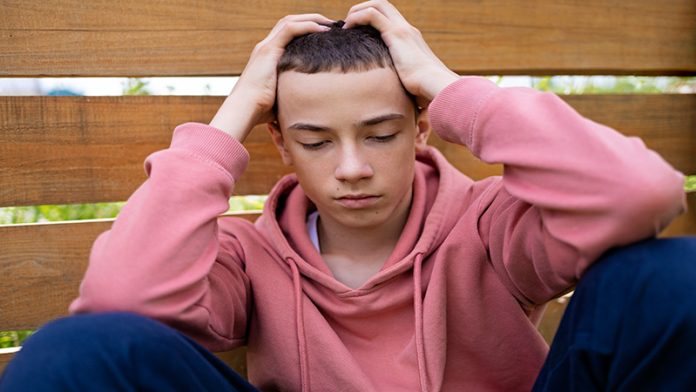
Teenage is a sensitive time; usually, teens are quite watchful and observe every tiny detail of their surroundings. Suppose a teen has gone through or witnessed any bad experiences and may not want to share those experiences with you or anyone. In that case, they have higher chances of developing post-traumatic stress disorder (PTSD). Like adult PTSD, PTSD in teens is marked by intense fear, anxiety, and damaging impacts triggered by that traumatic event.
When it comes to visiting a doctor, some people fear being labeled with mental disorders, which is why many people ignore the problem and let it go unaddressed. This is what leads to disasters. If your teen is going through a tough time, a doctor’s visit is a must, but if you or your teenager is not ready or comfortable with a doctor consultation, check out this article. Here you will get all the information you require at this stage, which will definitely help you take the right step. Without wasting more time, let’s get right into it.
What is PTSD?

PTSD, or post-traumatic stress disorder, is a mental health condition one may experience after a traumatic event. PTSD in teens may occur after encountering or witnessing some traumatic event in their teenage or childhood.
We all know how teen years are; this is the time when your teen needs your utmost attention because it is an intense and cataclysmic moment in their life. One moment your teen can be moody, and the next moment might be highly irritable. If you don’t dig into the reasons behind their mood swings, they can gradually develop mental health challenges. And if your teen has witnessed or experienced any sort of traumatic incident, you must not ignore the possibility of PTSD. Observe them minutely for the signs of PTSD, such as nightmares, flashbacks, increased rage, emotional detachment, or lacking concentration in studies and school.
Managing PTSD in teens can be challenging for both the teen and the family, but if you are concerned and want to know how to deal with the problem is a positive sign. Let’s dig into the info about PTSD in Teens —the signs and symptoms, causes, your role, and available treatment options.
Common Causes For PTSD in Teens
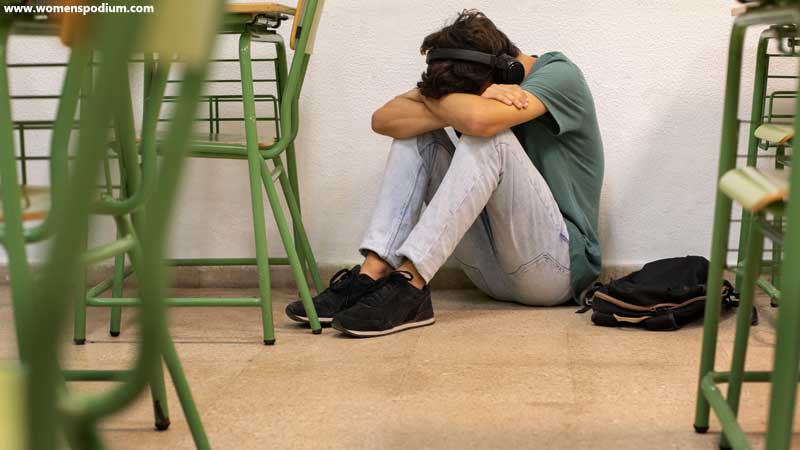
Teens react differently to PTSD than adults. What triggers their fear and leaves them suffering is the first step as parents, you must know. PTSD in teenagers may develop after encountering or witnessing some traumatic event. For instance:
- Bullying
- Feeling neglected or sidelined
- Severe car accidents, plane crashes or train wrecks
- Violent crimes
- Severe injury or illness or invasive medical procedures
- Natural disasters
- Losing a loved one
- Undergoing a major surgery
- Physical, emotional, sexual or verbal abuse, etc.
- Animal bites/attacks
- National tragedies (wars, economic crises, bombings, fierce protests)
- Sexual assault or molestation
- Physical assault (rape, kidnapping, or torture)
You might think that the list needs to be more comprehensive, but trust me, it will help you understand what can influence a teen’s mind and can develop mental trauma. However, it is not necessary that your child could develop PTSD even if they have gone through any of the above-shared incidents; it all depends on how he takes it. Still, the risk is high for developing PTSD if they undergo such an experience.
Symptoms Of PTSD in Teens
Teen PTSD sufferers get extremely emotional or encounter physical distress when exposed to circumstances that remind them of the triggering event. After the incident, they may undergo any of these below-shared symptoms over time.
1. Hyper Vigilance

This is one of the most common symptoms of PTSD in teens. If your teenager has developed PTSD, he might obsessively look out for potential danger. He can be paranoid and can get startled easily. In a few cases, some parts of the patient’s brain may get damaged encountering such a traumatic event. This can make them restless and utterly sensitive to loud noise. But with the help of proper guidance, they can get rid of anxiety associated with the disorder.
2. Reliving Or Re-Experience
Most of the time, teens who have PTSD suffer from reliving the traumatic event in one way or another. Following are some of the ways through which one might re-experience the painful event.
Flashbacks

During a flashback, a teen can see full or partial prints of the traumatic incident or hear sounds or words linked with that event. Sometimes, they can experience physical sensations, such as pain, even with the slightest touch. These flashbacks can occur without any identifiable trigger, leaving him overwhelmed and exhausted. The flashbacks seem so real that it becomes unattainable to detect the difference between reality and flashbacks, leaving your teen emotionally numb.
Nightmares

The chronic nightmare in PTSD usually involves replaying the traumatic event related to past trauma, leaving the person to feel like re-witnessing the horrific events as if they are back in that moment again. PTSD and nightmares are entangled in such a way that nightmares intensify PTSD symptoms, and PTSD, in turn, induces nightmares. Nightmares linked with PTSD are repetitive and may transpire during rapid eye movement (REM) sleep and at sleep outset, leading to nighttime awakenings, severe sleep disruption, insomnia, and making it difficult to get back to sleep again.
These nightmares are different from the nightmares of an average person. A straightforward way to differentiate between a usual nightmare and one due to PTSD is that the latter occurs early during the night or in different stages of sleep. Another difference between the two is body movements. The body movements of people with PTSD are relatively more aggressive.
Intrusive Memories

Another symptoms of PTSD in teens are intrusive memories. People living with PTSD can experience intrusive memories in the form of flashbacks, nightmares, and intrusive images. Intrusive memories are images or succinct snippets of the traumatic event that the person repeatedly relives without their conscience and are only recalled involuntarily. They are triggered by inner thoughts or emotions or external things that hold some connection to the traumatic event. Intrusive memories of a traumatic event can be uncomfortable and disruptive. People with PTSD are glued to their memories and past during which they experienced that painful incident which significantly impacts their mental health, lowers their self-confidence, and leaves them unfocussed, overlooking their present.
3. Disengagement With Everything
Survivors of these horrific events can go to any extent to avoid any stimulus which could cause them to recollect the dreadful event. As a result, they prefer to crawl back into the nest. If your teen has been to any such awful event, it will leave him upset and disengaged, and he might start avoiding his family, friends, studies and whatnot. Let’s look into it.
Drop in Grades Or Performance
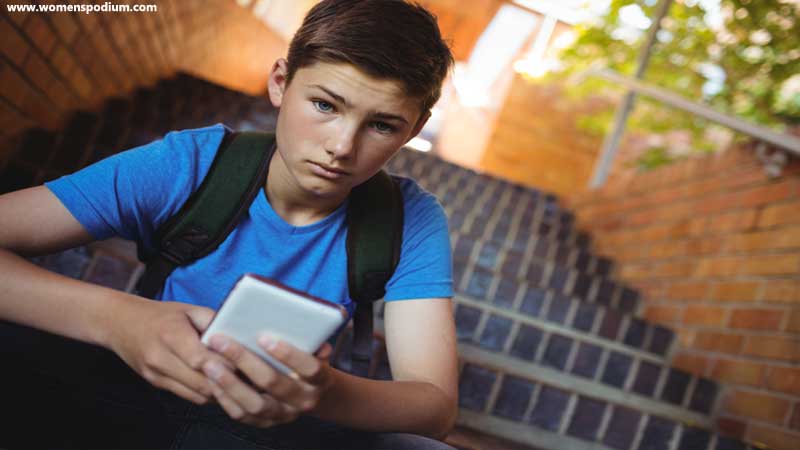
This is the easiest thing that teens with PTSD can embrace. Due to self-doubt, constant reminiscence of the event, social stress, and irritation, he creates a barrier between himself and his goals. All this instability and mental and physical health deterioration ultimately lead to a drop in his performance and grades. So, when such occasions arise, being a parent, you should address the issue, talk to him and help him to get rid of his inner turmoil before anything else.
Avoiding Social Life
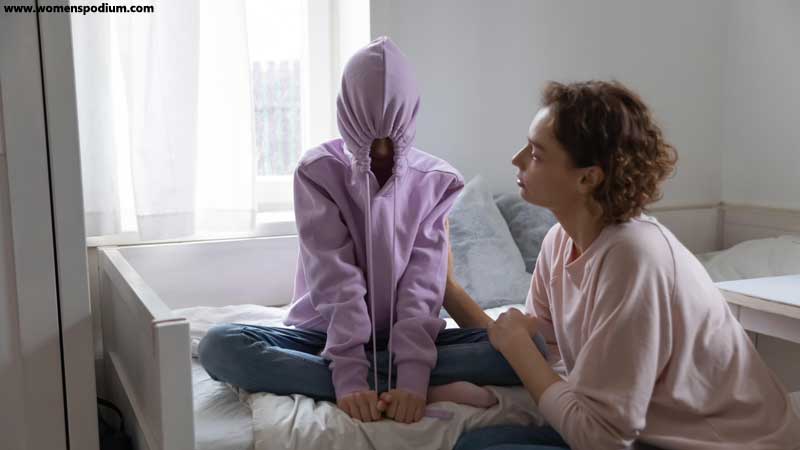
Teens, who have PTSD, become so disheartened and disturbed that they begin to live in their own shells. They try their best to cut their ties with their family; they even avoid their friends and other social engagements as well.
Depression

Depression is common in those who are suffering from PTSD. The symptoms of depression make everything so difficult that, often, it disrupts the mind in getting treatment. There are effective treatments for both depression and PTSD, so don’t ignore the symptoms and act quickly.
Suicidal Tendencies
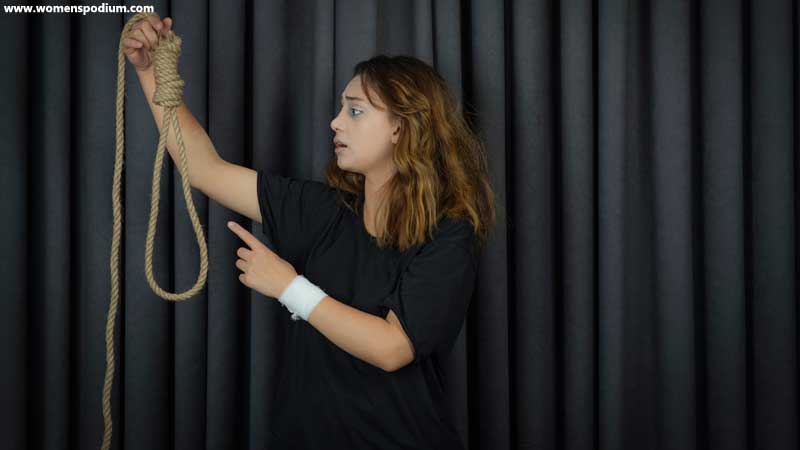
Feeling frustrated and losing hope are the most common symptoms of depression and PTSD. All the negative thoughts add up because of the recurring thoughts, flashbacks, and nightmares, thus leaving them to think about putting an end to their miserable life.
Diagnosis Of PTSD in Teens
The best way to diagnose PTSD in teens is to look at the symptoms and see if they are experiencing any of them. If you choose to see a doctor, make sure to tell them every little detail so that they can help to the fullest.
Treatment Of PTSD in teens
Fortunately, medical practitioners have found several PTSD treatment, which includes the following:
1. Cognitive Processing Therapy
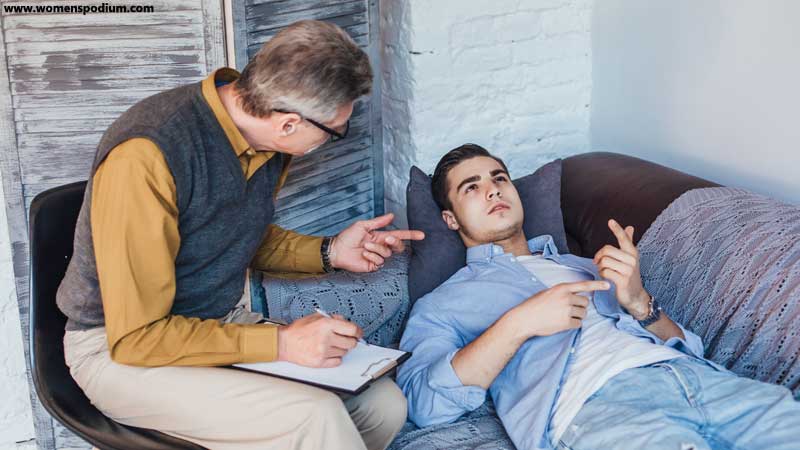
When your teenager finds it difficult to share his feelings with you, the best is to go for cognitive processing therapy. CPT is a specific type of cognitive behavioral therapy that has been useful in easing symptoms of PTSD. This talk therapy aids in recognizing the negative thoughts stuck in their mind and refraining them from getting out of their depressive zone.
2. Somatic Or Body-Based Therapy
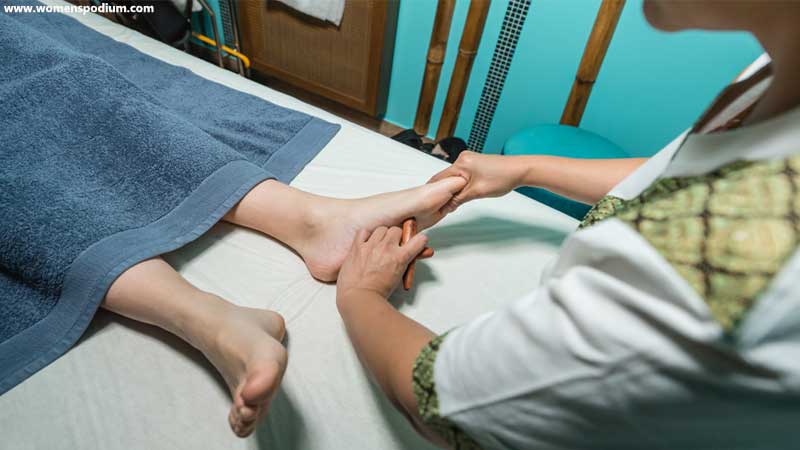
Somatic counseling, or somatic experiencing therapy, or SE therapy, is a therapy that helps in treating post-traumatic stress and other mental health conditions. This therapy connects a person’s mind and body to use psychotherapy and physical therapies during treatment. This treatment primarily aims to treat PTSD rather than the thoughts that lead to it.
3. Eye Movement Decentralization And Reprocessing (EMDR)

EMDR focuses on eye movements that help you digest the traumatic memories and evolve your reaction to them. When a PTSD patient undergoes EMDR, he gets access to the remembrances of a traumatic event in specific ways. With eye movements and guided instructions, accessing those remembrances helps the patient reprocess the memories from the hostile event differently—this reprocessing process aid in repairing the mental wound from that memory.
4. Play Therapy
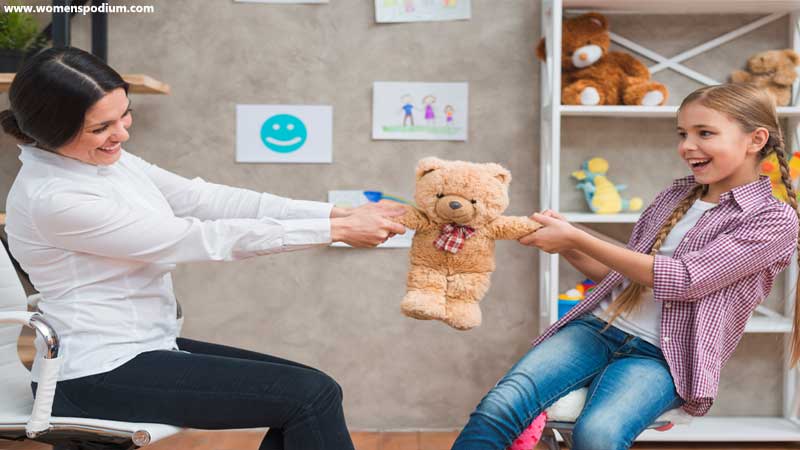
Play therapy is a technique that uses play to encounter and deal with psychological issues. This therapy is quite effective with children. It is a form of psychotherapy that uses play to aid children in dealing with emotional and mental health issues. As play is the medium, children feel free to explore their emotions and feelings and comfortably share them with their therapists, even with their parents sometimes. The main aim of play therapy is to help affected teens or children to analyze and express their emotions through various plays.
5. Dialectical Behavioral Therapy

Dialectical behavior therapy (DBT) is also a talking therapy similar to cognitive processing therapy but is based on cognitive behavioral therapy (CBT). DBT aims to help the patient to understand, accept and manage their emotional issues and complicated feelings. This therapy is for those who feel their emotions quite intensely.
6. Cognitive Behavior Therapy

Cognitive behavioral therapy (CBT) is also a talking therapy that helps patients manage their problems by changing how they think and behave.
In this therapy, the negative thoughts are modified that interfere with the patient’s life. It’s typically used to treat anxiety and depression but can be helpful for other mental and physical health problems.
Nonetheless, just like any other mental condition, PTSD can’t be cured without the willingness and cooperation of the patient. But being a parent, what you can do matters the most besides getting medical help for your child.
Parenting Tips For Teens With PTSD
Bad memories or experiences, or incidents usually stay with us and haunt us from time to time. I would not say all of us but most of us might have been through some bad experiences when we were teens. And if these issues are not appropriately addressed, they could severely impact our life, affect our mental health and disturb people around us. Being a parent, if you have gone through any such incident, it will be easier for you to relate with your teen, understand them, and guide them. Let’s read as parents what we can do for our kids.
1. Do A Thorough Research

PTSD is a psychiatric disorder that can be life-threatening, so the best way a parent can help their teens with PTSD is to gather as much information as they can. Understanding the signs, symptoms, and possible causes can help you find the right solution.
2. Know The Treatment Options

There are many potential treatment options for teens with PTSD. Everything depends mainly on your teen, his trauma, and his individual goals and thoughts. Being a parent, seeking out all the possibilities to treat your child gives hope to you both.
3. Be Patient

Your patience is key here; as a parent, you must understand your child’s mental status. Because if the event which is causing the flashbacks and nightmare is horrific, it will leave your child in extreme mental pain. You may get exhausted but can’t leave your child struggling, so be patient and tell your child that you are with them, no matter what.
4. Give Assurance

PTSD is a condition where the patients need unconditional support from their near dear ones. How busy you are, never alienate your teen; let them know you are with them, and you will never leave them alone in any circumstances. Your care, love, and assurance can turn the table.
5. Avoid The Trigger Causes

Many PTSD seizures are usually triggered by specific events, pictures, views, and sounds that remind them of the trauma they experienced in the past. As a parent, understanding the situation or thing that may trigger the episode helps you and your kid to deal efficiently with the trauma and avoid such scenarios.
Conclusion
According to the research conducted by the international journal of clinical practice, 447 adolescents match the standard scales created by medical practitioners for anxiety, depression, and PTSD. As many as 28% of teens have been diagnosed with anxiety symptoms, and 37.6% suffer from depressive symptoms. In contrast, 28.5% of teens lie in the category of moderate or higher levels of PTSD.
The number of cases of PTSD in teenagers has been horrifyingly increasing over the years. One of the main reasons for this is the heightened rate of PTSD in teens and the rapid increase in crimes. Detecting PTSD in teens may often be slightly tricky as some teens master the art of putting up a façade around people. However, being a parent, you are the first person to think about your child; your research and minute timely observation can change your child’s life. Never take PTSD lightly; timely medical help is always the best solution.
Also Read: FOMO in teenagers and grown-ups makes them sink in the world of likes and comments like a quicksand.






PTSD in teens can severely impact their mental health if untreated. Early diagnosis and therapy are key to recovery. Thanks for shedding light on this crucial topic.